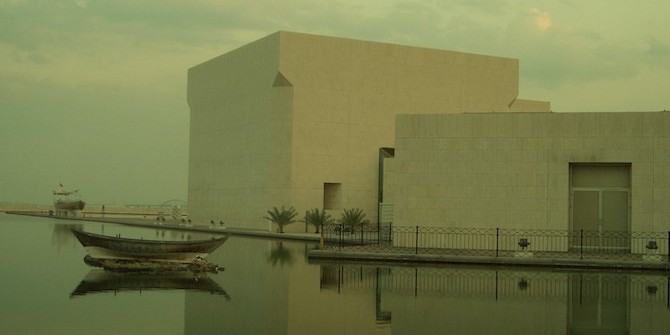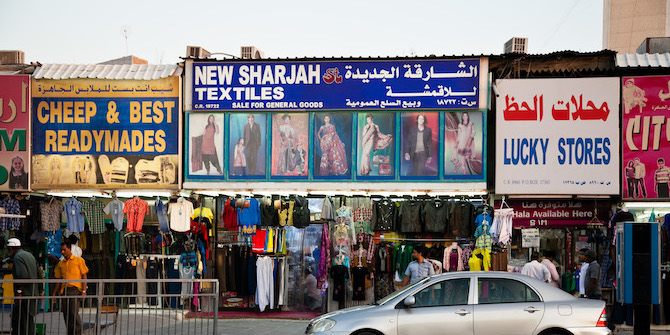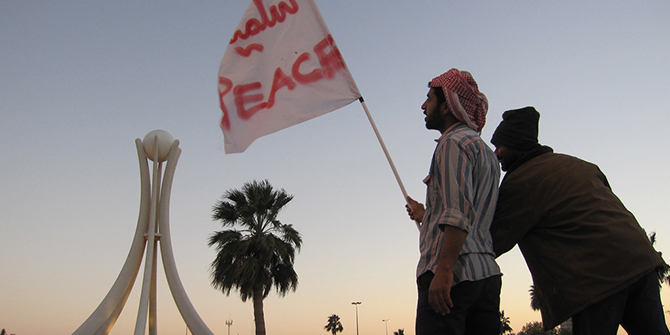by Steffen Hertog

The old social contract in the Gulf oil monarchies is gradually coming apart: in Bahrain, Oman and Saudi Arabia, countries with relatively lower oil income per capita, young citizens have lost access to the de facto government job guarantee that their parents enjoyed. At the same time, they are faring badly on private labour markets due to acute competition with large numbers of low-wage migrants. The other three GCC countries have relatively larger fiscal resources to maintain government employment but are likely to face similar challenges in the long run.
What could replace the old contract? In this blog post, I first outline the new insider-outsider cleavages that have emerged on labour markets for GCC citizens. I then discuss how these could be overcome through new forms of wealth distribution that would help integrate young citizens into private jobs at acceptable incomes while maintaining fiscal stability. I illustrate these policies with the example of Bahrain, a case at the sharp end of the region’s fiscal challenges where labour market cleavages are further complicated through sectarian biases in the social contract. The general arguments are applicable to the whole GCC, however.
Emerging Labour Market Segmentation in the GCC
The traditional social contract in the GCC is centrally based on government employment: Historically, since at least the 1973 oil boom, most male GCC citizens have come to expect to sooner or later land a secure and reasonably well-paid government job. This has resulted in staffing levels that lie substantially above what is actually needed to operate the public sector.
While there are other ways in which GCC governments share wealth with their citizens – including energy subsidies, free education, free healthcare, direct welfare payments, and housing support – government employment is by far the largest channel of wealth distribution. This has resulted in unusually wage spending: in the case of Bahrain, it reached 1.4b BHD in 2021, corresponding to 39.5% of total government expenditure and 56% of spending if debt service expenditure is excluded.
Bahrain is carrying an especially high fiscal burden through employment in the Ministry of Defence and the Ministry of Interior, both of which spend substantially more on salaries than the largest civilian employers such as the Ministries of Health or Education. Together with the National Guard, security-related wage expenditure constitutes 55.4% of all public wage spending, which again is unusually high in international comparison. Bahrain’s social contract is highly securitised and, by the same token, highly sectarianised as security sector employment is almost exclusively Sunni – adding another layer of complexity on top of the general challenges to the GCC social contract.
While GCC public sectors are huge, due to ongoing fiscal deficits wage spending in lower-rent Gulf countries has started to plateau during the last decade. As working age citizen populations continue to grow, the freeze in public employment means that new job market entrants only have a small chance of getting a government job, excluding them from the traditional social contract. In Bahrain, this at first mostly affected Shi’a citizens, yet most young Sunnis now are also excluded from government jobs.
This has created a new constituency of citizens who are labour market outsiders and have to make do in the private sector. Finding good private employment is difficult, however, for a number of reasons: first, and most important, citizens in the low to mid-skilled segments of the market face unusually harsh competition with low-cost migrant labour due to GCC economies’ large-scale reliance on foreign workers from the Global South. The state-employed middle class and the private sector benefit from this, but citizen labour market outsiders are paying a steep price for it, as wages outside of the small high-skilled market segments are low. As Table 1 shows, average citizen wages in the private sector lie substantially below those in the public sector.
Table 1: Average Monthly Wages for Citizens in Select GCC Countries
| Bahrain (BD, 2022) | Kuwait (KD, 2015) | Saudi Arabia (SAR, 2020) | UAE (AED, 2009) |
|
|---|---|---|---|---|
| Government | 733 (median) | 1,481 | 11,668 | 16,940 |
| Private Sector | 462 (median) | 1,269 | 8,031 | 13,550 |
Second, there is limited government support for citizens in the private sector: While there are minimum wages for citizens and national employment quotas for private firms, these do little to provide quality employment or middle-class wages (if anything, minimum wages make citizens less competitive vis-à-vis foreigners who are not subject to such rules). There are no general wage support transfers for lower-earning citizens. This contrasts with the implicit subsidy that is arguably built into the higher public sector wages for civil servants.
As a result of these factors, there is a large-scale phenomenon of ‘working poor’: More than one third of all privately employed Bahrainis in 2022 earned less than 350 BHD per month ($930), with the share being much higher among young citizens. Wage inequality in GCC private sectors is unusually high.
Outsiders as Political Constituency
There is good evidence that the presence of growing outsider strata has shaped politics across the GCC during the last decade or two. The majority of public demonstrations across the region have been economically motivated. Key demands of demonstrators have typically included a) the provision of government jobs and b) more government support to provide better-paying private sector jobs. These are clearly outsider concerns.
Even the Bahrain uprising in 2011, while primarily aiming at regime change, drew on a long tradition of protest by un- and underemployed young citizens. The events of 2011 did, however, contribute to the political marginalisation of movements that historically represented the interests of Bahraini outsiders, notably Al-Wifaq, an opposition movement with strong roots in the Shi’a working class. Al-Wifaq had in fact been a key partner for the Bahraini Crown Prince’s progressive labour reforms in the mid-2000s, notably the partial abolition of the migrant sponsorship system. This reform helped improve the competitiveness of Bahraini private sector workers as it made it harder for employers to exploit and underpay migrants. The exit of Al-Wifaq from formal politics after 2011 has made it harder to negotiate a new social contract that could offer citizen outsiders better economic prospects.
That said, as young Bahraini Sunnis have joined the ranks of labour market outsiders, there is now a new, cross-sectarian constituency that would benefit from broader labour reform.
Options for Change
What would a reform look like that would make the GCC social contract more inclusive and reduce the cleavage between insiders and outsiders? In the following, I present some general proposals that are illustrated, where applicable, with the example of Bahrain.
In the low- to mid-skilled labour market segment, citizens face the harshest competition with foreign workers and private wages are unlikely to ever reach levels that allow citizens a middle-class lifestyle. This means that if GCC countries want to combat the ‘working poor’ phenomenon, they need income support policies for lower earners in the private sector. Models for such support include the Earned Income Tax Credit in the US (EITC) or the Workfare Income Supplement in Singapore. These are ‘negative taxes’ under which low wages below a certain threshold are topped up through government grants. They are market-conforming as they don’t discourage work – like some conventional welfare benefits potentially do – but rather incentivise it. They also reduce wage inequality among citizens. They would help GCC citizens effectively compete with foreigners in all but the lowest-skilled professions.
Income support costs money. But it could easily be financed through reforms of other parts of the GCC welfare system. One avenue would be public employment reform, including providing more ‘golden handshake’ options for incumbent civil servants. Bahrain already created a voluntary retirement plan for state workers, introduced as part of the $10b budget support agreement with Bahrain’s GCC neighbours; this program could be deepened. The new availability of income support would also make private employment attractive to at least lower-skilled workers leaving the public sector.
There are currently about 100,000 Bahrainis employed in the private sector. Cutting the public payroll by 10% would liberate about 140m BHD of spending per year. This would provide 1400 BHD per privately employed citizen and considerably more if the income support policy only focused on lower income ones. If income support was given to individuals earning less than 600 BHD/month, 2200 BHD would be available per worker. Assuming the income support was available on a sliding scale below the 600 BHD threshold, government could easily provide workers on 300 BHD per month with a 200 BHD/month subsidy while still retaining fiscal savings. This would narrow the wage gap to the public sector, drastically reduce the number of ‘working poor’ and be a powerful signal that (former) outsiders are part of a new social contract.
Incidentally, if the government decided to suppress its current household electricity subsidies – another highly regressive and inefficient way of sharing wealth – this could also liberate funds of about 140m BHD, allowing similar large-scale welfare reforms and fiscal savings. There are ample options to reshape current wealth sharing policies to benefit outsiders while maintaining fiscal stability.
Income support for lower-earning GCC citizens could also be financed through increased fees on foreign workers, thereby making the policy revenue-neutral. Such fees are already levied on a substantial scale in Saudi Arabia. These fees would also further narrow the employment cost gap between citizens and foreign workers, incentivising firms to hire nationals. It would, however, be important to create a minimum wage for foreign workers to make sure the fees are not ‘passed on’ in the shape of lowered wages – and to generally improve labour rights for foreigners in order to reduce illicit competition. In practice, firms would recapture at least some of the fees because citizens receiving income support would typically lower their wage demands at least somewhat given that their post-subsidy earnings would still be higher.
In Bahrain specifically, smarter labour market policy could help social integration across sects. While political reconciliation after the unrest of 2011 remains remote, such integration could be a first step towards reduced sectarian polarisation and political decompression.
Advocating for the Reforms
Anywhere in the GCC, there will be skepticism about the above reforms in business and among parts of the publicly employed insider constituency. Business skepticism can be allayed by pointing to how income support policies will lower the employer-side wage costs of employing nationals.
Skepticism among public employees can be countered by pointing out that the income support and golden handshake policies will in fact give them new options that they did not have before. Perhaps more important, the current system is fiscally unsustainable and a gradual (voluntary) trimming of the public workforce will avoid much harsher forced adjustments later on, which could consist of drastic salary cuts, mass redundancies, or a currency devaluation that would strongly reduce real wages.
Finally, many older insiders have children who themselves are labour market outsiders. If they are interested in the long-term welfare of their families, they should support policies that ensure good jobs for their offspring.
[To read more on this and everything Middle East, the LSE Middle East Centre Library is now open for browsing and borrowing for LSE students and staff. For more information, please visit the MEC Library page.]







1 Comments